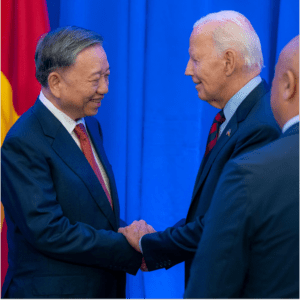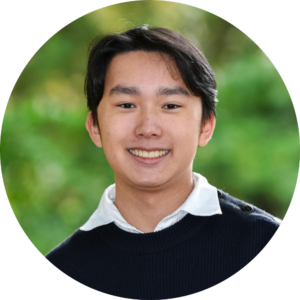17-year-old Camila Savelieva profiles Vietnam’s new leader and his policies at home and abroad

To Lam, Vietnam's new leader, meets US president Joe Biden in New York City, 25 September 2024.
November 29, 2024
Who is Vietnam’s new leader, To Lam?
To Lam was named the new leader of Vietnam earlier this year, first in the chiefly ceremonial role of president, then in the key position of general secretary of the Communist Party of Vietnam (CPV). So who is the man who has been travelling to meet world leaders to balance ties, and what are his plans for his country?
The new leader, aged 67 – who became the most powerful man in Vietnamese politics after the death of 80-year-old general secretary Nguyen Phu Trong – has held talks with both Chinese leader Xi Jinping and US president Joe Biden.
One of south-east Asia’s fastest-growing economies and home to the world’s second-largest rare earth reserves, the Socialist Republic of Vietnam (a one-party state) is emerging as a crucial economic player.
Vietnam’s remarkable geopolitical dexterity means it is able to collaborate with most major powers despite rivalry, becoming a strategic linchpin. In the geoeconomic sphere, it is poised to accept investment from major US tech companies along with substantial – and already present – infrastructure investment from China.
Vietnam’s “bamboo diplomacy”, an attitude reliant on flexibility and a perceived neutrality, is unlikely to change with Lam.
Lam was appointed president – a primarily ceremonial role that mainly involves meeting foreign dignitaries – by the Vietnamese National Assembly in May. He faced little competition thanks to the elimination of challengers due to corruption investigations headed by Lam himself. According to Carl Thayer, professor emeritus at the University of New South Wales in Australia, “The only person left was To Lam.”
The central committee of the CPV appointed Lam general secretary in August. In October, he was replaced as president by Luong Cuong.
As the new general secretary, Lam promises to lead a growing economy finding its footing in the international sphere, restore political stability after a stringent anti-corruption campaign led to disruptions in CPV leadership, with pragmatism and technological development being prioritised over ideological commitment. He also pledged to uphold what his predecessors had attained.




